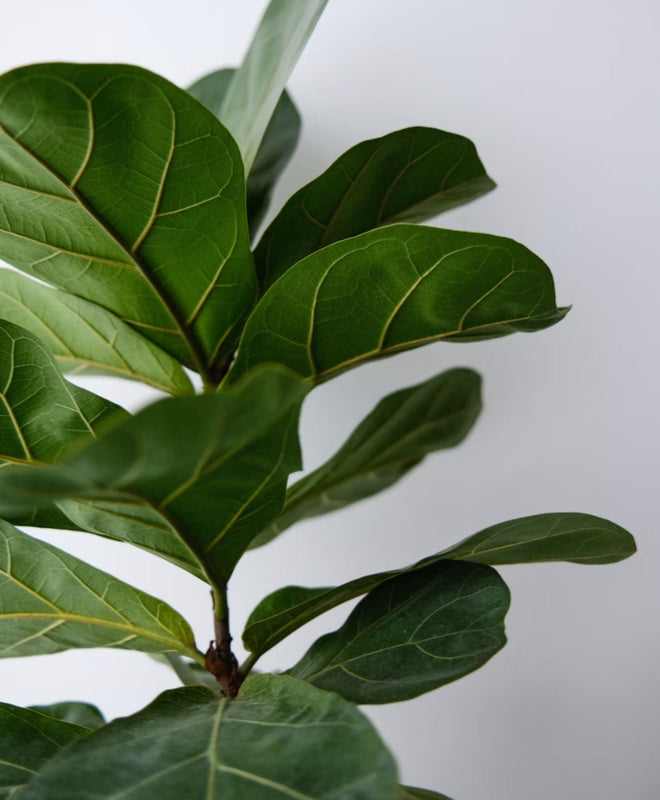
Care sheet: Ficus Lyrata
Pas le temps de tout lire ? 👇Cliquez ici pour un résumé👇
Sommaire

Here is the big, beautiful Ficus Lyrata on stem!
And at Pousse these ficuses have a name: Melchior and Lucas . They are part of the fig family and are also known as the lyre fig tree.
A true small indoor tree, in nature these ficus are stranglers: they end up strangling the trees on which they lean. Their size can go up to 15m! In our interiors they will not exceed 3 meters.
Maintenance sheet
Caring for this highly coveted tree on Pinterest and Instagram is relatively simple for those without a green thumb.
Exposure
Bright space but dreads direct sun, can like partial shade. In summer it can be placed outside. Its preferred temperature is between 18 and 25° C but be careful, it will not tolerate it falling below 7° C.
Watering
In summer, watering the equivalent of 1L once a week is sufficient. In winter, reduce the intake. Be careful here we are talking about a plant between 140 and 200cm. The bigger it is, the more you need to water. The ficus loves humidity.
The leaves of the ficus can take a little dust, do not hesitate to clean the foliage with a damp sponge.
Culture error
He doesn't really like being moved around and being put in the open air.
If the leaves of your ficus lyrata have a few black or brown spots, question its exposure, it should not be too close to a window with strong solar exposure (this does not count in winter). It can also come from a too dry interior, spray the leaves and create a humid atmosphere.
depolluting
Yes the ficus is a depolluting plant that eliminates many pollutants among them ammonia, formaldehyde, xylene, and toluene.
To know
The sap of the plant can cause irritation as it is mildly toxic.
For further
Although it is a houseplant, the Ficus Lyrata suffers the repercussions of the winter season which, in any case, is trying for it. If we add cultivation errors, it is obviously a guaranteed disaster, your tree can wither until it dies. All those who have adopted it will notice it, in the spring this evergreen makes new shoots without anyone having anything to do with it.
- Improper watering: What your Ficus needs is limited to weekly watering, with water at room temperature and ideally not calcareous. This is to be adapted to its living conditions, therefore more frequent and higher in summer or if it is exposed to a particularly dry atmosphere... near a heater for example (not recommended). A misting of the foliage, or an outdoor watering with rainwater, or even a shower invigorate it and give it a beautiful appearance.
- Air and light: It's a tough thing to take care of, so an airy interior doesn't mean you have to expose your Ficus Lyrata to drafts, which are downright its sworn enemies. As for clarity, give it a bright corner but, to avoid burns due to its rays, without direct sunlight. An interior that is too hot is as bad for it as a lack of light, learn to dose it to allow it to go through the seasons smoothly.
- Its location: Barring exceptions, avoid changing it, because any self-respecting Ficus needs time to adapt. If possible choose the period of repotting , knowing that its frequency is two to three years, to avoid too much stress for him to follow. As this is the time it takes before its interior becomes too cramped, you will kill two birds with one stone. Do not hesitate to give it fertilizer, once a month during its hibernation and every week in summer.
Note: The Ficus species includes at least 800 varieties of climbers, each with evergreen foliage. Whether in terms of shrubs, vines or even trees, whether grown indoors or outdoors, all have their interest! These are mostly exotic plants, adorned to brighten up our interiors but also a balcony or a veranda. Getting them through the bad season or protecting them from intense sunlight is therefore the least we can do.
POUSSE, the plant architecture agency that reconnects your spaces in Lyon, Paris and Bordeaux to nature.
Contact us: bonjour@pousse.fr
Written by aline jneid